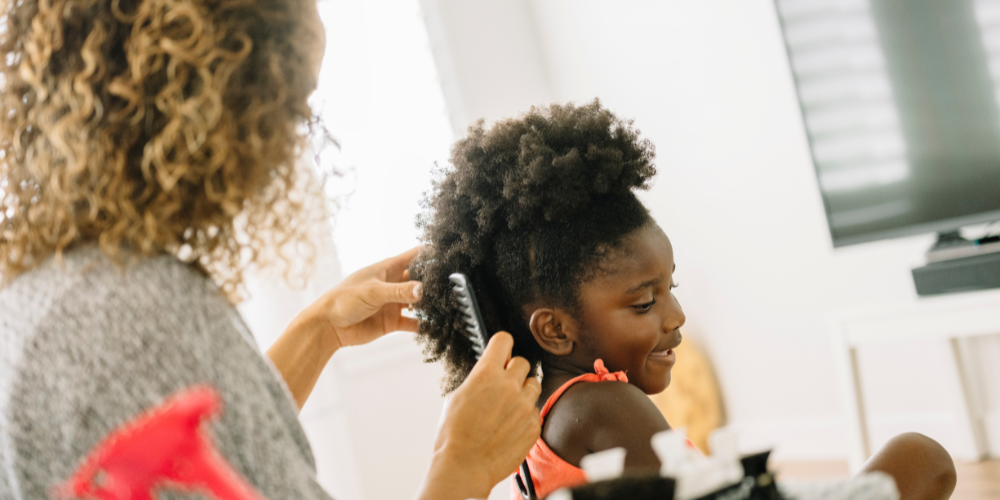Do you remember the evenings when your mother or grandmother called you to sit between her knees, armed with a comb and hair grease? I do—vividly. The pulling, the parting, the never-ending sections... and let’s not forget the tug of war between the comb and my 4C coils. It was a rite of passage, and at the time, I dreaded it. But looking back, I realize how those moments were about so much more than just doing hair. They were lessons in love, care, and strength.
For Black women and men, hair has always been about more than style—it's about identity, culture, and resilience. Our hair is a living connection to our heritage, passed down through generations. For centuries, Black hair care traditions have been lovingly handed from mother to daughter, grandmother to grandchild. These rituals not only keep our curls, coils, and kinks healthy but also honour the stories of those who came before us.
In this blog, we celebrate the "Generational Hair Wisdom" that keeps Black hair thriving through techniques and secrets shared within families, honouring the love and care that’s embedded in every strand.
The Art of Protective Styling: Braids and Bantu Knots
As a child, I never understood why my mother insisted on braiding my hair every night before bed. Now, as an adult, I get it—protective styles like braids and bantu knots were her way of making sure my hair stayed healthy and tangle-free. From intricate cornrows to simple box braids, these styles serve as shields against damage while letting our hair rest, free from daily manipulation.
Many of us learned the art of braiding from our grandmothers or aunts, who patiently showed us how to weave each strand with care. Bantu knots, another staple, not only protect but also create beautiful, defined curls when unraveled. It was more than a routine—it was a bonding experience, a weekly ritual where love and trust were built one braid at a time.

The Timeless Metal Comb: Straightening Without Damage
Before the age of flat irons, there was the metal comb, a staple in many Black households. Heated on the stove and passed through thick curls, the hot comb was the tool of choice for special occasions. The skill required to know just how hot the comb should be was an art in itself. Too hot, and you risked burning your hair (or scalp!); not hot enough, and it wouldn’t smooth the curls.

Older generations taught us patience with this process, which often took hours. The smell of hair oil sizzling on the comb, the careful tugs, and the gentle straightening are memories so many Black women share—a nostalgic reminder of both the care and precision involved.
Oils: Nourishing Scalp and Hair
Oils have always been a cornerstone of Black hair care. Whether it’s coconut oil, shea butter, or castor oil, these natural oils are passed down as the key to keeping our hair moisturised and strong. They seal in moisture, protect against breakage, and promote healthy growth—a vital part of managing textured hair.
For many of us, “oiling the scalp” was a Sunday evening tradition, a quiet moment shared with our mothers as they massaged the oil into our roots. It was about more than just hair—it was an act of love and care, a moment of connection between generations.
The Cultural Significance of Hair Tools: The Wide-Tooth Comb
The wide-tooth comb has long been heralded as a saviour for Black hair. Used to gently detangle curls without causing damage, it’s one of the first tools a child learns to use. Elders always warned against fine-tooth combs that would snag and break fragile hair strands, advising instead to handle curls with care and patience. The act of detangling hair, often done in sections, remains an important part of the generational wisdom passed down in Black communities.
Nighttime Rituals: Preserving the Crown
Every night, our mothers and grandmothers would remind us to tie up our hair before bed—whether with a silk scarf, satin bonnet, or by braiding it. This tradition is about more than just keeping our hair neat; it’s about preserving the moisture and health of our hair, protecting it from the friction of cotton pillowcases that can lead to breakage.
These nighttime rituals are sacred—they're moments of self-care that have been passed down for generations. As our grandmothers braided the last section of hair, they would tell us stories, passing on wisdom with every twist and plait.

Hair as a Reflection of Identity and Resilience
What’s often overlooked is the deeper, emotional connection Black women and men have to their hair. Our hair has been a symbol of resistance, identity, and resilience, especially during times when it was not celebrated. Older generations lived through times when natural hair was stigmatized, yet they passed down a profound love for it, teaching younger generations to embrace their beauty.
Many of us can recall how grandmothers or mothers would lovingly say, “Your hair is your crown,” encouraging us to hold our heads high, no matter what society said. These words of affirmation, woven with the care of each braid or twist, are the ultimate generational wisdom: that Black hair is beautiful, worthy, and powerful.
Passing the Torch: Sharing Hair Wisdom with the Next Generation
As we grow older, we find ourselves becoming the keepers of this hair wisdom. Teaching the next generation how to care for their hair—whether it’s braiding, oiling, or tying it at night—is more than a beauty routine. It’s about preserving our culture and embracing the love for our natural hair that our ancestors and parents passed down to us.
In a world where natural Black hair was once deemed "unruly" our resilience has allowed us to rise above those perceptions. Legends like Madam C.J. Walker responded to those stigmas with innovation and love, developing products that helped Black women care for their hair with pride and dignity. Her work wasn’t just about straightening hair—it was about empowering Black people to express themselves confidently, without needing to conform to Eurocentric beauty standards.
Today, we continue that legacy, using the love and wisdom from generations past to celebrate the beauty of our hair. Our braids, twists, locs, and curls are not just styles—they’re symbols of creativity, self-expression, and confidence. Each time we honour our hair, we honour the rich history, resilience, and culture that define us.

